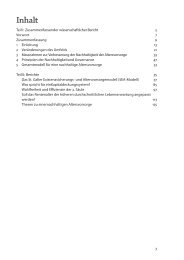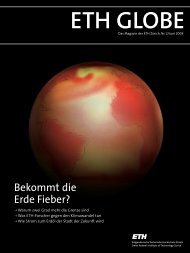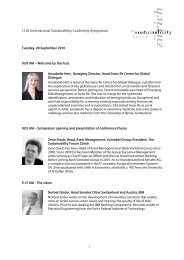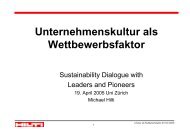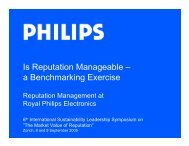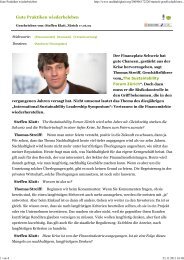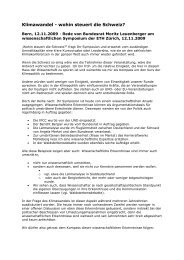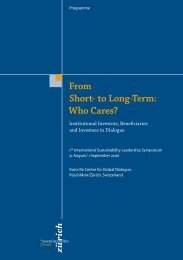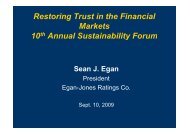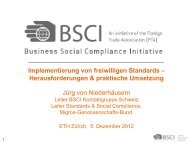Fostering Corporate Responsibility through Self- and Co-regulation
Fostering Corporate Responsibility through Self- and Co-regulation
Fostering Corporate Responsibility through Self- and Co-regulation
You also want an ePaper? Increase the reach of your titles
YUMPU automatically turns print PDFs into web optimized ePapers that Google loves.
Method <strong>and</strong> research design<br />
Method <strong>and</strong> research design<br />
This study is largely based on the book <strong><strong>Co</strong>rporate</strong><br />
<strong>Responsibility</strong> in Europe: Government Involvement<br />
in Sector-specific Initiatives by Thomas<br />
Beschorner, Thomas Hajduk <strong>and</strong> Samuil Simeonov.<br />
The explorative study was jointly conceptualised<br />
by the Bertelsmann Stiftung (Germany)<br />
<strong>and</strong> the Institute for Business Ethics at<br />
the University of St. Gallen (Switzerl<strong>and</strong>).<br />
We used a two-step research design: The first<br />
phase included an online survey, a snap poll<br />
<strong>and</strong> telephone interviews with experts. The second<br />
phase focused on examples of sector-specific<br />
CR initiatives <strong>and</strong> how they work.<br />
The online survey addressed national CR experts<br />
in the eight countries. The aim was to<br />
gather information about sector-specific CR initiatives.<br />
Furthermore, national trade associations<br />
were polled with regard to their views on<br />
CR. The respondents were asked about the importance<br />
of CR in their industry, about the most<br />
relevant challenges <strong>and</strong> issues their industry<br />
faces, <strong>and</strong> about their preference regarding certain<br />
types of government involvement. Lastly,<br />
telephone interviews with international CR <strong>and</strong><br />
industry experts were conducted in order to obtain<br />
an international perspective. In total, 42<br />
national CR experts <strong>and</strong> 34 national industry<br />
experts participated in the online survey <strong>and</strong><br />
the snap poll, respectively. Moreover, 16 telephone<br />
interviews with international experts<br />
were conducted.<br />
School of Business) for France; Anja Schäfer<br />
(The Open University Business School) for the<br />
UK; Steen Vallentin <strong>and</strong> Andreas Schmiegelow<br />
(<strong>Co</strong>penhagen Business School) for Denmark;<br />
<strong>and</strong> Christoph Weber-Berg, Sabrina Stucki <strong>and</strong><br />
S<strong>and</strong>ra Huber (HWZ University of Applied Sciences<br />
in Business Administration, Zurich) for<br />
Switzerl<strong>and</strong>. Desk research was conducted in<br />
parallel with these phases.<br />
The sample of countries was determined on the<br />
basis of political <strong>and</strong> socioeconomic differences<br />
in Europe <strong>and</strong> the consequently different approaches<br />
to CR. It includes seven EU member<br />
states representing different types of market<br />
economies <strong>and</strong> one member of the European<br />
Free Trade Association (Switzerl<strong>and</strong>).<br />
We chose sectors that have a broad range of<br />
differences (in terms of business models, economic<br />
structures, consumers <strong>and</strong> other factors).<br />
Moreover, they are significant to their country's<br />
economy (understood as a share in the country’s<br />
GVA). It is noteworthy that the five sectors<br />
are on a fairly high level of aggregation,<br />
which noticeably differs from the everyday use<br />
of these terms <strong>and</strong> sometimes even from companies’<br />
underst<strong>and</strong>ing of them. For example,<br />
financial services include financial transactions<br />
as well as insurance <strong>and</strong> pension funding,<br />
while the manufacture of chemicals includes<br />
the pharmaceutical industry, which is not a subject<br />
of this study.<br />
The second part builds on close collaboration<br />
with leading European CR scholars in the relevant<br />
countries. These scholars included: Marta<br />
de la Cuesta González <strong>and</strong> Eva Pardo (National<br />
Distance Education University Madrid)<br />
for Spain; Tobias Gössling (Tilburg University)<br />
for the Netherl<strong>and</strong>s; Janusz Reichel (University<br />
of Łódź) for Pol<strong>and</strong>; Julia Roloff (ESC Rennes<br />
56




